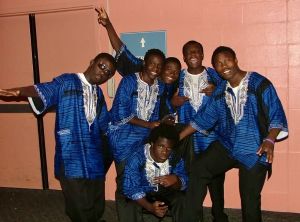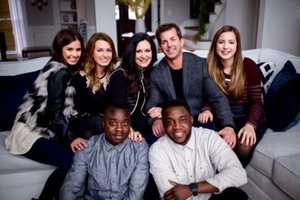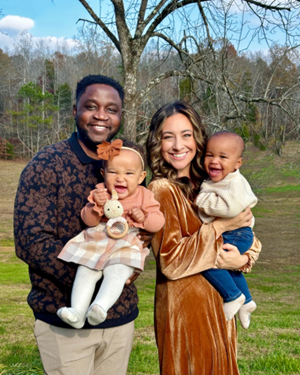Jackson TerKeurst is a Liberian civil war survivor and adoptee who share his journey to belonging, identity and family in a new book.
 Gunfire, explosions, the sound of crying women and children – this was the daily reality of seven-year-old Jackson TerKeurst during the 1990s civil war in Liberia, West Africa, after rebels invaded his village and separated his family.
Gunfire, explosions, the sound of crying women and children – this was the daily reality of seven-year-old Jackson TerKeurst during the 1990s civil war in Liberia, West Africa, after rebels invaded his village and separated his family.
Jackson survived the horrors of war, which included months of hiding in the jungle with his aunt and stints in five orphanages. His miraculous journey, which he attributes to God’s intervention, includes finding his way to a Christian orphanage called Monrovia Home, joining a choir, travelling to America on the choir’s fundraising tour, and perhaps most surprising of all being adopted by American writer Lysa TerKeurst and her family in North Carolina.
Here are some of the lessons he says he’s learned through his adoption journey.
Belonging takes time
When Jackson was adopted at the age of 15, he was coming from a life of war, trauma, starvation and loss. Adjusting to a peaceful, structured North American home was a blessing, but also tremendously difficult.
He says, “Coming into a loving home where you're suddenly being introduced to family rhythms, rules, and structure was a blessing, but also a deep internal struggle. I didn't know how to receive love or trust stability at first. On top of that, I didn’t look like my family, and it took a while to open up and let them in. There were moments when I felt deeply unseen – like no one could fully understand where I came from or what I had walked through.”
Jackson’s journey has taught him that a sense of belonging doesn’t occur instantly; it requires space for grief and sometimes even professional resources like counselling.
He explains, “The journey of belonging takes time, but when love makes room for the full story, healing becomes possible.”
 Cultural identity is not either/or
Cultural identity is not either/or
Jackson learned that embracing both his African roots and his American experience allows for a fuller, truer identity.
When returning to Liberia as an adult, he was able to reunite with family members and even discovered that his mother and father were in fact alive after the war. Jackson explains, “Reuniting with my biological family has been a gift, but it’s also reopened grief. I’ve learned that I don’t have to choose one identity over the other. I can hold both my past and my present as part of who I am becoming.”
God redeems our brokenness
After all the childhood nights of fear, hunger and insecurity, Jackson now sees how God has used every chapter to shape him.
“God works through our pain and redeems our past. Adoption has helped me understand the heart of God in a deeply personal way. Being chosen by a family on Earth gave me a clearer picture of what it means to be chosen by God. It’s not about perfection. It’s about grace.”
When young Jackson eventually found stability at Monrovia Home, he met Pastor Kofi and learned about the gospel. He also joined a singing choir with other boys in his orphanage, which was ultimately his ticket to America, where he met his adoptive family.
“Adoption has taught me that God is a redeemer. He doesn't just rescue; He restores. He takes the broken places of our lives and builds something beautiful out of them. Through adoption, I've learned that love can rewrite a story, and that even in our hardest chapters, God is still writing with purpose.”
The Church can – and should – walk with adoptive families
Jackson believes the Church plays a vital role in adoption – not just as a source of families, but as ongoing support systems. “The Church can model what it means to sacrificially love and practically support adoptive families and walk with children through healing and belonging.”
At the time that he met Lysa, she was busy with her three biological children and running the Proverbs 31 ministry for women, but she still responded to God’s call to care for the orphan (James 1:27) and adopted Jackson and his orphanage “brother” Mark.
Her North Carolina community then rallied together and provided families and homes to over 20 others from Monrovia Home. Jackson reflects, “Orphan care is more than a mission project; it's part of the gospel. It's about being the hands and feet of Jesus in a world that desperately needs hope.”
Parents should lead and listen with humility
To adoptive families, Jackson offers this wisdom, “Let your child’s culture be something you champion, not something you fight to change. And most of all – listen.”
He emphasizes that children from hard places need time, patience and space to share their stories when they're ready. By giving them unconditional love and the acceptance of their full identity in all its complexities, adoptive parents can help children thrive in new and unfamiliar environments.
Through adoption, Jackson enjoyed many incredible opportunities afforded by his newfound freedom in America, such as graduating from college, marrying and giving birth to twins.
He concludes in reflecting on both his earthly and spiritual adoptions, “For me, adoption didn't start with paperwork. It started with the feeling of being seen, safe, and wanted. I’ve come to believe that our truest identity is found not in what we've lost, but in who we belong to.”
Leah Sutterlin of Sherbrooke, Que., works for the National Council for Adoption, headquartered in Alexandria, Virginia. Jackson TerKeurst recently published a book on his life story called The Only Way Forward Is Back (David C Cook, 2025).